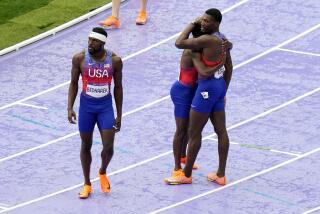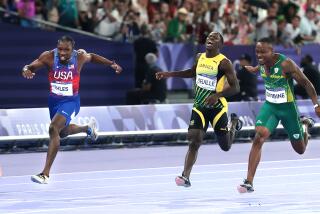WORLD CHAMPIONSHIPS ROUNDUP : U.S. 400 Relay Team Is Primed
- Share via
TOKYO — Carl Lewis took Saturday off after competing on four of the previous seven days in track and field’s World Championships, but the U.S. 400-meter relay team still ran the second-fastest time in history, 37.75 seconds, in qualifying for Sunday’s final.
With little competition in the heat, U.S. team members Andre Cason, Leroy Burrell, Dennis Mitchell and Mike Marsh were chasing the world record of 37.67 set by Marsh, Mitchell, Burrell and Lewis this summer. Lewis, who won the 100 and finished second in the long jump, will replace Marsh on the anchor leg in the final.
“The record will definitely fall if we can get the stick around,” Mitchell said.
That was a problem for the U.S. women’s 400-meter relay team. The lead runner, Carlette Guidry, and the second runner, Esther Jones, could not complete the exchange in Saturday’s semifinal as the United States failed to finish.
“Carlette said she thought Esther had the stick; Esther said she never got it,” said Evelyn Ashford, who was supposed to run the anchor.
Earning a berth in the men’s 400-meter final as the eighth and final qualifier was the Canadian team, which includes Ben Johnson. After serving a two-year suspension after he tested positive for an anabolic steroid in the 1988 Summer Olympics, he was unable to defend his world championship here in the 100 meters because he finished fourth in the Canadian championships.
“He is like any other athlete,” Mitchell said. “You guys (in the media) make him big, but we make him small.”
Switzerland’s Werner Guenthor retained his shotput championship with a best of 71 feet 1 1/4 inches, but a two-time world champion, Germany’s Martina Hellmann, finished fourth in the women’s discus. Bulgaria’s Tsvetanka Khristova dramatically improved from fourth to first on her final throw, a 1991 world best of 233 feet.
Algeria’s Hassiba Boulmerka became Africa’s first woman to win a gold medal in a world championship with a time of 4:02.21 in the 1,500 meters. The Soviet Union’s Tatiana Dorovskikh, who won the 1,500 and the 3,000 under the family name of Samolenko in 1987, finished second. She retained her title last week in the 3,000 meters.
The only U.S. finalist, PattiSue Plumer, had an unusual explanation for her 12th-place finish. “I got bit by a dog yesterday,” she said. “Maybe that affected me more than I thought.”
Japan’s Hiromi Taniguchi gave the home crowd something to cheer about, winning the men’s marathon with an incredible kick to finish in 2 hours 14:57 minutes. Ahmed Salah of Djibouti was second in 2:15.26.
American Steve Spence also had a strong finish to take third in 2:15:36.
Taniguchi, a 31-year-old chemical worker, has won seven of 14 marathons he has entered, including Tokyo (twice), London and Rotterdam. “I must say I got a tremendous support from the crowd,” he said.
On a day when the United States won no medals, Brian Diemer was fifth in the 3,000-meter steeplechase. Kenya’s Moses Kiptanui and Patrick Sang finished 1-2.
Considering the apparent political dissolution of the Soviet Union, the most poignant moment of the championships came in Saturday’s 50-kilometer walk, when Alexander Potashov and Andrei Perlov linked arms on the final lap and crossed the finish line together. Potashov is from the republic of Byelorussia and Perlov is a Russian from Siberia.
Although the same time, 3:53.09, was recorded for both, Potashov was awarded the gold medal and Perlov the silver. But they have decided to cut the medals in two, each getting half a gold and half a silver that they will weld together into one medal.
More to Read
Go beyond the scoreboard
Get the latest on L.A.'s teams in the daily Sports Report newsletter.
You may occasionally receive promotional content from the Los Angeles Times.







